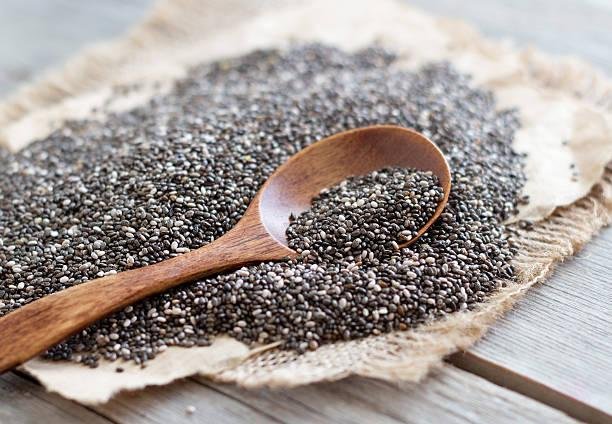Chia seeds have gained immense popularity due to their nutritional value. Packed with fiber, omega-3 fatty acids, antioxidants, and protein, these tiny seeds offer a wide range of health benefits. Let’s explore the top 10 benefits, how to incorporate them into your diet, and potential side effects.

Top 10 Benefits of Chia Seeds
- Rich in Nutrients: Chia seeds are a powerhouse of essential nutrients like fiber, protein, omega-3 fatty acids, calcium, and antioxidants.
- Weight Management: The high fiber content in chia seeds promotes satiety, helping you feel fuller for longer and potentially aiding in weight management.
- Improved Digestive Health: The soluble fiber in chia seeds can help regulate bowel movements and prevent constipation.
- Lower Blood Sugar Levels: Studies suggest that chia seeds may help improve blood sugar control, making them beneficial for individuals with diabetes.
- Heart Health: The omega-3 fatty acids in chia seeds can help reduce inflammation and lower the risk of heart disease.
- Stronger Bones: Chia seeds are a good source of calcium, which is essential for maintaining bone health.
- Hydration: Chia seeds absorb water, creating a gel-like substance that can help you stay hydrated.
- Boosted Energy: The sustained energy release from chia seeds can help combat fatigue.
- Skin Health: The antioxidants in chia seeds may help protect your skin from damage caused by free radicals.
- Muscle Building: The protein content in chia seeds supports muscle growth and repair.
How to Use Chia Seeds

Chia seeds are incredibly versatile and can be easily incorporated into your diet. Here are some popular ways to use them:
- Add to Yogurt: Sprinkle chia seeds on your yogurt for a crunchy texture and extra nutrients.
- Make Chia Pudding: Combine chia seeds with milk or plant-based milk, let it sit for a few hours, and enjoy a creamy pudding.
- Sprinkle on Salads: Add chia seeds to your salads for a boost of fiber and healthy fats.
- Bake with Chia Seeds: Incorporate chia seeds into bread, muffins, or cookies for added nutrition.
- Create Chia Jam: Make a low-sugar jam using chia seeds as a thickening agent.
Potential Side Effects
While chia seeds are generally safe for most people, excessive consumption may lead to some side effects:
- Digestive Issues: Consuming too many chia seeds without adequate water intake can cause digestive problems like bloating and constipation.
- Allergic Reactions: People with nut allergies may experience allergic reactions to chia seeds.
It’s essential to consume chia seeds in moderation and stay hydrated. If you have any concerns, consult with a healthcare professional.
By incorporating chia seeds into your diet, you can enjoy their numerous health benefits and enhance your overall well-being.
Chia seeds benefits for females?
Chia seeds are packed with nutrients and offer a variety of benefits that can be particularly advantageous for females. Here are some key benefits:
Nutrient-Rich: Chia seeds are loaded with essential nutrients like fiber, protein, omega-3 fatty acids, vitamins, and minerals. They’re especially high in calcium, magnesium, and iron, which are important for overall health and bone strength.
Supports Digestive Health: The high fiber content in chia seeds helps promote regular bowel movements and can prevent constipation. Fiber also supports a healthy gut microbiome, which is important for digestion and overall health.
Heart Health: Chia seeds are an excellent source of omega-3 fatty acids, which are known to reduce inflammation and support heart health. Omega-3s can help manage cholesterol levels and reduce the risk of heart disease.
Weight Management: The combination of fiber and protein in chia seeds can help with satiety, making you feel fuller for longer. This can assist in weight management by reducing overall calorie intake.
Bone Health: Chia seeds are rich in calcium, magnesium, and phosphorus, all of which are essential for maintaining strong bones and preventing conditions like osteoporosis.
Hormonal Balance: The omega-3 fatty acids and fiber in chia seeds can help regulate hormone levels and support overall hormonal balance, which is particularly beneficial for menstrual health and menopause.
Blood Sugar Control: Chia seeds can help stabilize blood sugar levels due to their high fiber content. This can be particularly beneficial for managing blood sugar levels and reducing the risk of type 2 diabetes.
Skin Health: The antioxidants in chia seeds, along with their omega-3 fatty acids, can help maintain healthy skin by reducing inflammation and protecting against oxidative damage.
Incorporating chia seeds into your diet is easy—they can be added to smoothies, yogurt, oatmeal, or salads. However, it’s always a good idea to consult with a healthcare provider or a nutritionist to ensure they fit well with your individual dietary needs and health goals.
Chia seeds benefits for skin
Chia seeds offer several benefits for skin health due to their rich nutrient profile. Here’s how they can be beneficial:
Hydration: Chia seeds are known for their high water absorption capacity. When soaked, they form a gel-like consistency that can help keep your skin hydrated from the inside out. Proper hydration is essential for maintaining skin elasticity and reducing the appearance of fine lines and wrinkles.
Rich in Omega-3 Fatty Acids: Chia seeds are an excellent source of alpha-linolenic acid (ALA), a type of omega-3 fatty acid. Omega-3s help reduce inflammation and can improve skin conditions such as acne and eczema. They also support the skin barrier, helping to lock in moisture.
Antioxidant Properties: Chia seeds contain antioxidants like quercetin, chlorogenic acid, and caffeic acid. These antioxidants help protect the skin from oxidative stress caused by free radicals, which can lead to premature aging and damage.
Anti-Inflammatory Effects: The omega-3 fatty acids and antioxidants in chia seeds can help reduce inflammation in the skin. This can be particularly beneficial for inflammatory skin conditions like acne, psoriasis, and eczema.
Nutrient-Dense: Chia seeds are packed with essential nutrients such as vitamin E, zinc, and B vitamins, which support healthy skin. Vitamin E is a powerful antioxidant that helps protect skin cells from damage, while zinc plays a role in skin repair and regeneration.
Improved Skin Elasticity: The high content of alpha-linolenic acid (ALA) in chia seeds supports the production of collagen and elastin, proteins that are crucial for maintaining skin elasticity and firmness.
Sun Protection: The antioxidants in chia seeds can offer some protection against UV damage, though they shouldn’t replace sunscreen. They help neutralize free radicals generated by sun exposure, which can reduce the risk of sunburn and premature aging.
Wound Healing: The nutrients in chia seeds, including omega-3s and zinc, can support the skin’s natural healing processes. This can be helpful for minor cuts, abrasions, and other skin injuries.
To incorporate chia seeds into your skincare routine, you can consume them as part of your diet or use them topically in face masks and scrubs. For internal benefits, adding them to smoothies, yogurt, or oatmeal is an easy way to include them in your daily diet.
how long does chia seed pudding last
Chia seed pudding generally lasts about 4 to 5 days when stored properly in the refrigerator. Here are a few tips to help ensure it stays fresh:
Storage: Keep the pudding in an airtight container to prevent it from absorbing odors or flavors from other foods in the fridge.
Refrigeration: Store it in the refrigerator at or below 40°F (4°C). Chia seed pudding is best enjoyed cold.
Check for Freshness: Always check the pudding for any signs of spoilage before eating. If it develops an off smell, unusual texture, or mold, it’s best to discard it.
Serving Size: If you’re making a large batch, consider dividing it into smaller portions. This can help minimize exposure to air and bacteria each time you open the container.
Chia seed pudding can be a convenient make-ahead breakfast or snack, and its shelf life makes it a practical option for meal prepping.
chia seed pudding with coconut milk
Chia seed pudding made with coconut milk is a delicious and creamy option that’s both dairy-free and flavorful. Here’s a simple recipe to make chia seed pudding with coconut milk:
Basic Coconut Milk Chia Seed Pudding Recipe
Ingredients:
1 cup coconut milk (canned or from a carton; if using canned, shake well before measuring)
1/4 cup chia seeds
1-2 tablespoons sweetener (like honey, maple syrup, or agave syrup), adjust to taste
1/2 teaspoon vanilla extract (optional)
Instructions:
Mix Ingredients: In a mixing bowl or jar, combine the coconut milk, chia seeds, sweetener, and vanilla extract (if using). Stir well to ensure the chia seeds are evenly distributed.
Refrigerate: Cover the bowl or jar and refrigerate for at least 4 hours, or preferably overnight. The chia seeds will absorb the liquid and form a gel-like consistency.
Stir: After the initial 30 minutes, stir the mixture to break up any clumps of chia seeds. This will help achieve a smoother texture.
Serve: Once the pudding has thickened to your desired consistency, give it a final stir. Serve it chilled, and top with your favorite toppings such as fresh fruit, nuts, seeds, or a drizzle of honey.
Tips:
Consistency: If the pudding is too thick after refrigerating, you can stir in a little more coconut milk to reach your preferred consistency.
Flavor Variations: You can add spices like cinnamon or cocoa powder to customize the flavor. For extra richness, you might also mix in a dollop of coconut cream.
Toppings: Enhance the pudding with toppings like fresh berries, sliced bananas, shredded coconut, granola, or a sprinkle of nuts.
This chia seed pudding is not only easy to make but also versatile and can be adjusted according to your taste preferences. Enjoy!
are chia seeds good for you
Yes, chia seeds are considered very beneficial for health due to their impressive nutritional profile. Here’s why they’re good for you:
Nutrient-Dense: Chia seeds are packed with essential nutrients, including:
Omega-3 Fatty Acids: These healthy fats support heart health, reduce inflammation, and can improve brain function.
Fiber: High in dietary fiber, chia seeds promote digestive health, help maintain bowel regularity, and support weight management by promoting satiety.
Protein: They are a good plant-based source of protein, which is important for muscle repair and overall bodily functions.
Vitamins and Minerals: Chia seeds provide essential nutrients like calcium, magnesium, phosphorus, and manganese, which are vital for bone health, energy production, and various bodily functions.
Digestive Health: The high fiber content in chia seeds aids in digestion and can help prevent constipation. They also support a healthy gut microbiome.
Heart Health: Omega-3 fatty acids in chia seeds can help lower blood pressure, reduce cholesterol levels, and decrease inflammation, all of which contribute to cardiovascular health.
Blood Sugar Control: The fiber and protein in chia seeds can help stabilize blood sugar levels by slowing down the absorption of sugar, which can be beneficial for managing diabetes or preventing spikes in blood sugar.
Weight Management: Due to their high fiber content, chia seeds can help you feel full longer, which can assist in controlling appetite and supporting weight loss or maintenance.
Bone Health: Chia seeds are rich in calcium, magnesium, and phosphorus, which are important for maintaining strong bones and preventing conditions like osteoporosis.
Antioxidant Properties: Chia seeds contain antioxidants that help protect cells from damage caused by free radicals, which can reduce the risk of chronic diseases and support overall health.
Hydration: When soaked in liquid, chia seeds absorb water and expand, forming a gel-like substance. This can help maintain hydration and support healthy skin.
Incorporating chia seeds into your diet is relatively easy. They can be added to smoothies, yogurt, oatmeal, salads, or used as an egg substitute in baking. However, like with any food, it’s best to consume them as part of a balanced diet. If you have any specific health concerns or conditions, it’s always a good idea to consult with a healthcare provider or nutritionist.